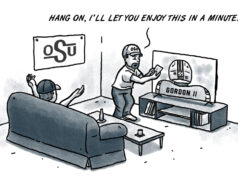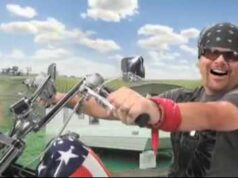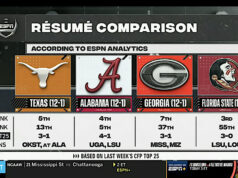
(Editor’s note: The following condensed excerpt from Robert Kerr’s latest book, The Sociology of Sports-Talk Radio, has been edited slightly for content and style.)
A couple of years ago, NonDoc published a condensed excerpt from my 2015 scholarly book, How Postmodernism Explains Football, in which I highlighted the way Bob Stoops seemed to instinctively relish contesting narratives — aggressively and effectively. I had drawn upon analysis of media representations of football over the course of the game’s existence to consider the fundamental assertion of postmodernist theory: that narratives, or explanatory stories, most often fail ultimately to reliably explain important social phenomena. It’s not the kind of book sports fans snap up, but it did receive the 2017 Outstanding Book award from the Communication and Sport Division of the National Communication Association last year, earning it a bit of egghead cred.
Stoops was still OU’s head coach when I wrote that book, and his fierce challenges to sports writers’ narratives provided a lively example of what I conceptualized as the “hyper-mediated marketplace of commercial-football narratives.” My follow-up, The Sociology of Sports-Talk Radio, sought to detail the essential dynamics that make all that endless talking so vital to so many.
In considering sports-talk radio across the country, I again found vivid examples of truly and fully contested narrative struggle in Oklahoma. The weekday afternoon programing of Oklahoma City’s WWLS The Sports Animal dominates its market with something of a tag-team effort in which Jim Traber opens, then is joined by Al Eschbach, leading into The Total Dominance Hour, when local sports writer Berry Tramel enters the conversation. One afternoon early in the 2016 football season, they provided me with the most absolutely perfect example of how relentlessly and indefatigably sports-talk radio’s participants often press forward with narratives they insist most accurately impose the correct meaning.
Central Michigan upsets OSU
Just after Traber came on the air to an intro that bills him “the man. The myth. The Ego,” he began a lengthy rant about the bizarre way Oklahoma State’s game had ended the preceding weekend. With his trademark bombastic certitude, grounded in a long athletic career of his own, Traber first argued with callers. He continued on that topic after he was joined by Eschbach, the New Jersey native who has been active in local sports-talk radio longer than anyone else, more than 40 years.
In OSU’s game, Central Michigan pulled off a major upset on the last play — after what was later declared to be an incorrect penalty on OSU. Traber repeatedly asserted his narrative for understanding the meaning of those events, condemning OSU Coach Mike Gundy and his staff, first for calling the long, deliberately incomplete pass (instead of a running play) that officials flagged for intentional grounding, and then for not more aggressively protesting the call. When Eschbach came on, he expressed agreement, and they proceeded the routine discussion of other games.
All that ended abruptly once they were joined by Berry Tramel, the longtime Oklahoman columnist, on radio something of a snarky Jed Clampett, both folksy and subtly edgy. That segment is always opened and closed with either Traber or Eschbach announcing, “This is the Total –” followed quickly by the other adding “Dominance –” and Tramel contributing, “Hour!”
When Eschbach casually asked Tramel: “Any thoughts on Oklahoma State, that fiasco finish?” Tramel offhandedly observed that players tend to “let that kind of stuff go quicker than anyone else, compared to coaches, fans, media,” and that he didn’t mind the defense OSU utilized on the game-losing play. At that point, Traber could contain himself no longer, and exclaimed, “What?” as Eschbach began to chuckle. After more discussion about whether Gundy should have designed OSU’s penalized play so as to reduce the chances of penalty, Tramel declared that “irrelevant” and said, “Gundy’s problem Saturday was not that call. Gundy’s problem was not trusting his instincts that the refs were wrong. We’ve been talking about, he should have known —” and that is when Traber first cut him off, screaming,
“I don’t believe a word of that! I can’t believe you’re being sucked in. He did not know the rule.”
Debate moves to another level
At that point, the debate wasn’t all that different from other, regular arguments on sports-talk radio, but it moved to another level as the exchanges grew more heated and lengthy. It began to be apparent that both Traber and Tramel were certain about the greater meaning that should be taken from the agreed-upon facts that the officials misinterpreted a rule and Central Michigan executed a remarkable final play to win — and that each arrived at that certainty via respective epistemological paths.
As the argument continued, Tramel tried to press his essential point that Gundy didn’t challenge the call more strongly because “that’s human nature. That’s what we do when authority says, ‘No, I’m right.’” Traber countered: “I don’t know about you, but if I’m sure of something, and authority says I’m wrong, I’m gonna tell them, ‘Sorry, no, you’re not right, I’m right.’”
The exchange grew so heated the segment ultimately ran much longer than usual, and the participants seemed to lose all interest concerning the next commercial break. They continued to debate every possible nuance of the matter but never found the least agreement. Eschbach could be heard cackling in the background as Traber had loudly cut Tramel off repeatedly, insisting, “I think you’re off your rocker,” and, “I can’t believe that you are so naive that you think he knew the rule.”
Tramel, finally growing louder, responded, “Do I have to yell? Is that what I have to do to be able to talk on this show? Do I have to yell?”
About then, Eschbach tried to wrap the segment: “Let us take a break. A Chapel Supply Water break. Thanks, Berry. Um —” but Traber cut him off.
“By the way, Tram, go, go write an article about how Mike Gundy didn’t do anything wrong. Make sure you do that.”
Tramel replied: “I told you what he did wrong. It all started after the ball went into the seats. That’s when Gundy started messing up.”
Agreement upon meaning remains elusive
They continued to argue, yell and cut each other off for some time. Finally, Eschbach tried again to close the segment, saying, “Where you at, Jim?” a line he and Traber regularly use for signaling the other to repeat where they are doing their remote and plug the sponsor before going to commercial break.
Instead, Tramel cut in: “I was the one talking to the referees.”
Traber: “I’m at Advanced Body Scan. Yeah, I don’t believe a word of it, sorry. I’m not gonna be as naive as you are. Where are you, Al?”
Eschbach: “Uh, I’m at the Zu Sports Grill. We’ll come back with Dean. 91.5 WLS The Sports Animal. More of The Total –” and stopped for Traber to follow.
Traber: “Dominance –” but at that point when Tramel should chime in with “Hour,” there was a longer than usual pause. Finally, Tramel was heard saying, “I’m –” but then was cut off by bumper music playing out the segment and a commercial for Lasik surgery.
For their listeners, it was likely one of the more entertaining editions of the Total Dominance Hour. For me and my egghead analysis, it provided the most complete, evocative example of the process through which narratives are contested in the hyper-mediated marketplace of commercial-football narratives. The events of the game in question were all available via multiple camera shots of the relevant moments and endless video replays. Yet, it remained the case that even two such veteran sports-media commentators could not come anywhere near agreement on the meaning of what happened.





















